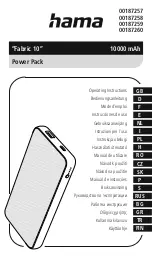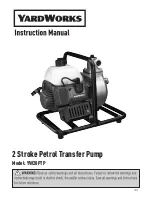
Application
Grit
(coarse/fine sanding)
Orbital stroke rate level
Intermediate paint sanding
120/400
5/6
Lacquer/varnish
40/80
5/6
Softwood
40/240
5/6
Hardwood
60/320
5/6
Veneer
240/320
5/6
Aluminium
80/240
5
Steel
60/240
5
Derusting steel
40/120
6
Stainless steel
120/240
5
Stone
80/200
6
Scraping
English
Select a high orbital stroke rate level for scraping.
Work on a soft surface (e.g. wood) at a flat angle
and with low contact pressure. Failure to do so
may cause the scraper to cut into the surface un-
derneath.
Temperature-dependent overload protection
English
In normal conditions of use, the power tool can-
not be overloaded. If the power tool is overloaded
or not kept within the permitted battery temperat-
ure range, the speed is reduced or the power tool
switches off. At reduced speed, the power tool
will run again at full speed once the permitted bat-
tery temperature is reached or the load is re-
duced. If it automatically shuts down, switch the
power tool off, allow the battery to cool down,
then switch the power tool back on.
Recommendations for Optimal Handling of the
Battery
English
Protect the battery against moisture and water.
Only store the battery within a temperature range
of −20 to 50 °C. Do not leave the battery in your
car in the summer, for example.
Occasionally clean the ventilation slots on the bat-
tery using a soft brush that is clean and dry.
A significantly reduced operating time after char-
ging indicates that the battery has deteriorated
and must be replaced.
Follow the instructions on correct disposal.
Maintenance and Servicing
English
Maintenance and cleaning
English
u
Remove the battery from the power tool be-
fore carrying out work on the power tool (e.g.
maintenance, changing tool, etc.). The bat-
tery should also be removed for transport and
storage.
There is risk of injury from unintention-
ally pressing the on/off switch.
u
To ensure safe and efficient operation, al-
ways keep the power tool and the ventilation
slots clean.
Regularly clean Riff application tools (accessories)
using a wire brush.
Transport
English
The contained lithium-ion batteries are subject to
the Dangerous Goods Legislation requirements.
The batteries are suitable for road-transport by the
user without further restrictions.
When shipping by third parties (e.g.: by air trans-
port or forwarding agency), special requirements
on packaging and labelling must be observed. For
preparation of the item being shipped, consulting
an expert for hazardous material is required.
Dispatch battery packs only when the housing is
undamaged. Tape or mask off open contacts and
pack up the battery in such a manner that it can-
not move around in the packaging. Please also
observe the possibility of more detailed national
regulations.
Disposal
English
The machine, rechargeable batteries,
accessories and packaging should be
sorted for environmental-friendly re-
cycling.
Do not dispose of power tools and bat-
teries/rechargeable batteries into
household waste!
Only for EU countries:
English
According to the Directive 2012/19/EU, power
tools that are no longer usable, and according to
the Directive 2006/66/EC, defective or used bat-
tery packs/batteries, must be collected separately
and disposed of in an environmentally correct
manner.
1 609 92A 4RW • 17.12.18
English
| 23
















































